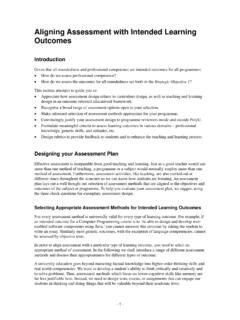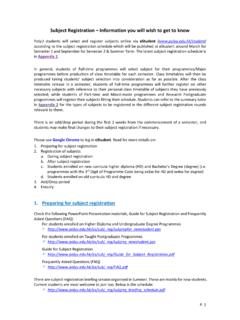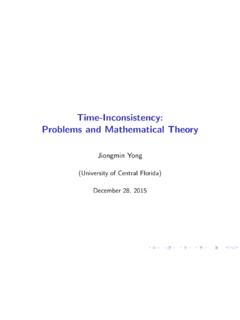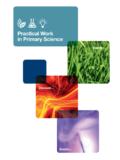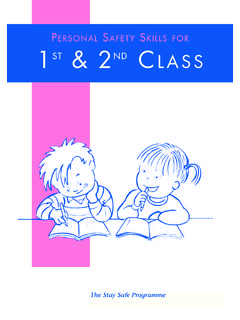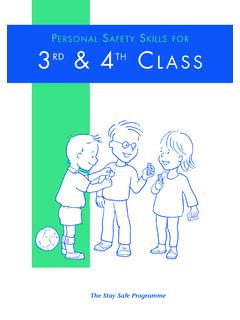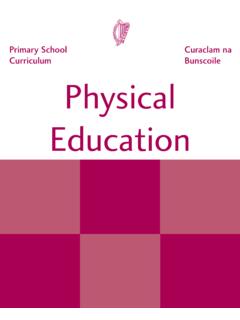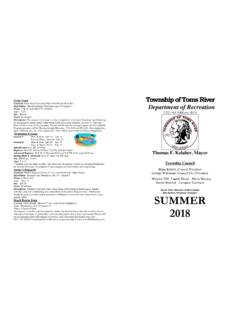Transcription of Defining Intended Learning Outcomes (ILOs) - PolyU
1 - 1 - Defining Intended Learning Outcomes (ILOs) An outcome -based curriculum design begins with Defining the student Learning Outcomes for the programme and the component subjects. This section attempts to guide you to do that. This section is organised as follows: What are Intended Learning Outcomes ? aims to help you understand the role of Intended Learning Outcomes and the implications for various aspects of university education in general. Our ultimate outcome : all-round development of students with professional competence elaborates the significance of Outcomes with respect to PolyU s mission.
2 Action verbs and levels of performance for outcome statements discusses various levels of outcome statements and performance. Programme Outcomes and subject Outcomes distinguishes between programme Outcomes and subject Outcomes . Examples of Learning Outcomes (for your discipline) offers lists of exemplary Outcomes by discipline. Principles for effective outcome statements deals with the principles and technicalities of writing Intended Learning Outcomes . Last, there is a checklist that summarises the key points.
3 What are Intended Learning Outcomes ? Let us imagine this situation now: we sit down and start writing the outcome statements. What are we supposed to write? At the beginning of every semester teachers write up objectives and syllabus topics for their programmes and lessons. What have they written? Do they differ from Intended Learning Outcomes ? To clear some confusion and answer these questions, let us distinguish some important differences between the outcome -based approach and some common traditional approaches to curriculum planning.
4 The Distinction between Learning Outcomes and Syllabus/Content In brief, Intended Learning Outcomes represent achievement attained by students instead of topics to be covered, the latter being typically the purpose of a syllabus. It is common that when teachers plan their curricula, they start by thinking about the relevant topics to teach a task that we can call Defining the syllabus, which is certainly one important curriculum planning task. Defining the syllabus is related to but NOT, by itself, specifying Learning Outcomes . Take a hypothetical swimming course as example: the syllabus of the course could be incorporated with contents such as safety guidelines , breathing techniques , body motions , and swimming styles , whilst the outcome of the course would be to swim in water effectively and safely.
5 The distinction between Outcomes and contents is important. The adoption of the outcome -based approach implies a change in perspective from content to knowledge, abilities and attitudes achieved by students . In the outcome -based approach, the main concern is, of course, the Outcomes . To elaborate, what are the desirable qualities of the graduates from your programme(s) and subject(s)? What knowledge and skills you want and expect your students to demonstrate? What level of performance should they demonstrate to be able to excel in their prospective role of entry-level professionals?
6 For instance, for the same topic about a particular chemical product, a programme aimed at producing chemical engineers who develop the product differs from another aimed at producing marketing executives for the product. Though students essentially need to learn the same topic, they will focus on different perspectives and will use the knowledge in different ways and different contexts. This is why the Outcomes and desirable qualities are so important and therefore must be stated explicitly. For this - 2 - purpose, let us look at the following two lists taken from the subject benchmark statements of Health Studies, according to the Quality Assurance Agency for Higher Education.
7 List A 1. the ability to make comparisons between a range of health contexts, such as individual and institutional and national and international contexts; 2. the ability to analyse health and health issues, and health information and data that may be drawn from a wide range of disciplines; 3. the ability to synthesise coherent arguments from a range of contesting theories relating to health and health issues; 4. the ability to draw upon the personal and lived experience of health and illness through the skill of reflection and to make links between individual experience of health and health issues and the wider structural elements relevant to health; 5.
8 The ability to articulate central theoretical arguments within a variety of health studies contexts; 6. the ability to draw on research and research methodologies to locate, review and evaluate research findings relevant to health and health issues, across a range of disciplines. (Source: Health Studies, QAA, 2004) List B The Health Studies graduates will demonstrate knowledge and understanding of: 1. health as a contested concept; 2. the multidisciplinary nature of health studies; 3. the central place of research activity in the development of the subject; 4.
9 The diverse determinants of health; 5. the contemporary issues at the forefront of the subject; 6. the range of realist and constructionist theories of causality relating to health; 7.. (Source: Health Studies, QAA, 2004) List B is basically a content list. Please note that even with phases such as acquire knowledge and understanding added to the statements, they are still not effective outcome statements. Verbs such as know and understand are too vague to be good verbs for outcome statements as they fail to indicate what the students are able to perform, academically or professionally, with that knowledge.
10 This becomes very clear when these statements are compared with those in List A. List A contains good examples of outcome statements at the programme level. These outcome statements clearly delineate the academic abilities and performance of the students as a result of academic Learning . Please note that action verbs in the outcome statements are highlighted. As illustrated, using action verbs gives outcome statements a much clearer articulation of academic performance than the words understanding and knowledge . To elaborate, these action verbs provide indications of the appropriate level of performance, beyond simply knowing.
